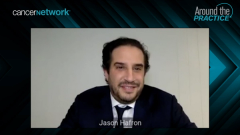
Optimization of Genetic Testing for mCRPC
Jason M. Hafron, MD, CMO, and Oliver Sartor, MD, share their approach for the optimal management of mCRPC through genetic testing.
Episodes in this series

Raoul S. Concepcion, MD: Jason, you and I have talked about this off and on through the years. Being chief medical officer of a fairly large group, how are you trying to push forward for these progressive patients? Is there a battery of tests, if you will, as Dan and Oliver have talked about? What are you trying to push forward to make sure that your providers are appropriately testing and understanding what therapies are out there?
Jason M. Hafron, MD, CMO: Working in a large urology group practice, we have the benefit of using analytics, third-party software, to identify these patients, to make sure that these patients are being properly evaluated. It’s hard for our partners to keep up with the pace of advancement in prostate cancer. What we focus on is developing processes and pathways to make sure that these patients are being treated according to guidelines. When they fail a line of therapy, they’re getting the appropriate somatic testing. We send the panels out with third parties and make sure that these people are getting evaluated. And if they’re not, through our software the physicians will be prompted or reminded that, “Your patient Mr. Jones needs to get tested.” We don’t have the luxury of a Dr Sartor or a Dr Petrylak in our community, in our practice. Most of our community oncologists treat everything. What we’ve found is that we have to be the leaders for GU [genitourinary] oncology for prostate cancer. We have to do the testing ourselves. We don’t have access to highly specialized GU oncologists like Dr Sartor or Dr Petrylak.
Raoul S. Concepcion, MD: Great comments, Jason. Lenny, I’m going to ask you 2 questions. Probably the first one is more of an interest. I want to get your stance on where do we stand now, because everybody was so consumed with it, with AR-V7 testing? And then No. 2, from your personal perspective, because you obviously have an institution that’s the forefront leader in genomic testing and counseling for prostate cancers, how do you guys work these patients into your very robust genetic testing program? Speak about AR-V7 first.
Leonard G. Gomella, MD, FACS: We work with Kevin Kelly, DO, here. Like Jason’s out there, we happen to have somebody right next door to us, and Dr Kelly and myself, and Adam Dicker, MD, PhD, care for these patients jointly. Everything is a group discussion when we start treatment, and then we send them off to the different providers. AR-V7 was great. It’s a great tool, but at the end of the day, we know that the AR-V7 has a very variable cycle that sometimes you can clear a lot of the cells. Sometimes they return. I have to say that it’s great research tool, but in our world here at the Sidney Kimmel Cancer Center, we don’t use it. Again, it’s a very strong research tool, but the variability in AR-V7 over time makes it less useful. Is that the first cleanup?
Raoul S. Concepcion, MD: Yes, that was the first one. And now talk about your relationship with your very robust testing with your genetics clinic.
Leonard G. Gomella, MD, FACS: We’re blessed here to work with Veda Giri, MD. She’s been incorporated into our GU health clinic since 2014. Everybody when they walk in the door gets a brief introduction to genetic testing. We don’t necessarily do genetic testing right away, but we let them go through their treatment. A lot of quick questions about family members get answered. One thing that I’ve become fascinated by is that about 5% to 10% of men with newly diagnosed prostate cancer have the bad DNA repair pathway genes, localized cancer. This is an untapped area. These are the gentlemen who need our attention because we know more likely than not, if you don’t treat them right up front they’re the ones who are going to develop metastatic castrate-resistant disease and ultimately die. We spent a lot of our time today on advanced prostate cancer and somatic and genetic testing. But the next wave is going to be getting back and identifying the men with localized prostate cancer who have the genetic fingerprint that they’re in trouble into the future and they need to be treated aggressively, let’s say without active surveillance or without a conservative management approach. I think that’s going to be our next wave of identification.
Raoul S. Concepcion, MD: Very well said. We have 1 question, which is, I’ve been told that when a man has a recurrence of prostate cancer, he should immediately see an oncologist. Isn’t that a bit premature with all the new treatments the urologists are gaining? Jason, thoughts?
Jason M. Hafron, MD, CMO: In our practice, it’s not an automatic referral to the oncologist. We’re in the community. We’re not in a university setting. I’ve been in advanced prostate cancer for almost 10 years now, and we treat it ourselves, from diagnosis to death. I don’t think you need to refer to an oncologist. That being said, it depends on your relationship with the university, your position in the community, and honestly, this is a fast-paced field right now. You must be involved and up to date on the trials and the guidelines because this is a deadly prostate cancer. This isn’t a Gleason 6 score, active surveillance. These are the guys who can get very sick if improperly treated.
Raoul S. Concepcion, MD: The best answer I ever heard, and I’m going to steal your thunder Dan. Somebody asked this question to Dr Dan Petrylak, and I thought Dan gave the best answer. The most appropriate specialist to treat advanced prostate cancer is the person who’s most comfortable and knowledgeable. It’s not specialty specific. It’s the person who’s most comfortable and the most knowledgeable. It could be a urologist; it could be a medical oncologist. But all of us are moving toward understanding the multiple therapies. And Lenny, as you’ve said repeatedly, all of us believe it is a multidisciplinary approach. With that being said, I’m going to give each one of you 30 seconds for final thoughts, if any.
Daniel P. Petrylak, MD: Who’s first?
Oliver Sartor, MD: I’ll give you a final thought. We didn’t talk at all about PSMA [prostate-specific membrane antigen]-based therapy, which is going to be coming. And if you read your New England Journal of Medicine in September of this year, you would’ve seen that PSMA Lutetium-177 is prolonging survival. Stay tuned.
Raoul S. Concepcion, MD: Absolutely. Dan?
Daniel P. Petrylak, MD: We’re about to enter a phenomenal era. Molecule medicine and therapeutic events are beginning to intersect. The improved survival that you’re seeing with the PEACE1 trial will continue to be shifted toward longer survivals with the development of new agents and new treatments.
Raoul S. Concepcion, MD: Jason?
Jason M. Hafron, MD, CMO: I agree with Oliver. I’m excited about the lutetium PSMA and applying this in the clinic. This is groundbreaking, disruptive technology that I’m excited to apply to my patients once it becomes widely available. I’m excited for that.
Raoul S. Concepcion, MD: Dr Gomella, once again in the cleanup spot.
Leonard G. Gomella, MD, FACS: Thank you for that. What we’re going to be seeing here, again lutetium is great, but I also think the pendulum is going to be going back to dealing with the primary, the local disease in the setting of metastatic disease. We’re seeing more and more data suggesting you’ve got to get rid of the beehive to prevent the bees from spreading, and we’re going to be operating on or radiating a lot more localized disease in the coming years.
Raoul S. Concepcion, MD: I want to thank all the panelists. A wonderful discussion. I want to thank the people who logged in, the reviewers, and I want to thank the folks from CancerNetwork® and Urology Times®.
Transcript Edited for Clarity
Newsletter
Stay up to date on recent advances in the multidisciplinary approach to cancer.










































